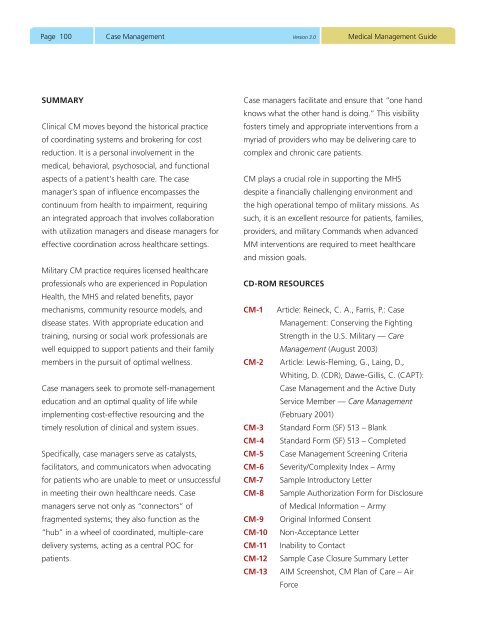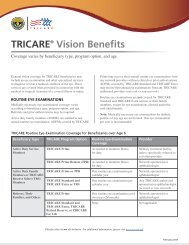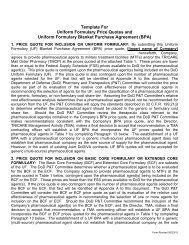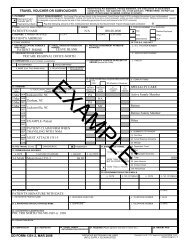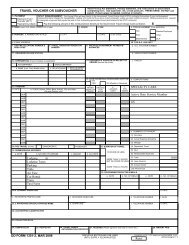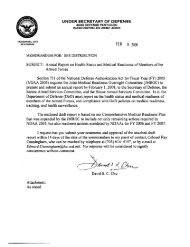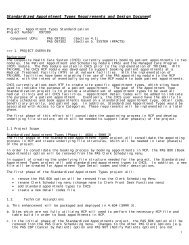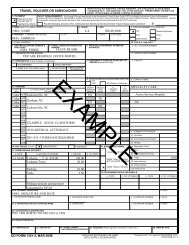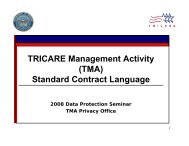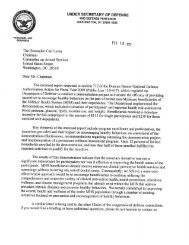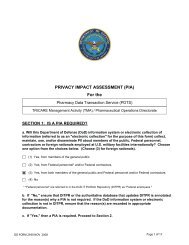Medical Management Guide, 2009, Version 3.0 - Tricare
Medical Management Guide, 2009, Version 3.0 - Tricare
Medical Management Guide, 2009, Version 3.0 - Tricare
- No tags were found...
Create successful ePaper yourself
Turn your PDF publications into a flip-book with our unique Google optimized e-Paper software.
Page 100Case <strong>Management</strong> <strong>Version</strong> <strong>3.0</strong><strong>Medical</strong> <strong>Management</strong> <strong>Guide</strong>SUMMARYClinical CM moves beyond the historical practiceof coordinating systems and brokering for costreduction. It is a personal involvement in themedical, behavioral, psychosocial, and functionalaspects of a patient’s health care. The casemanager’s span of influence encompasses thecontinuum from health to impairment, requiringan integrated approach that involves collaborationwith utilization managers and disease managers foreffective coordination across healthcare settings.Military CM practice requires licensed healthcareprofessionals who are experienced in PopulationHealth, the MHS and related benefits, payormechanisms, community resource models, anddisease states. With appropriate education andtraining, nursing or social work professionals arewell equipped to support patients and their familymembers in the pursuit of optimal wellness.Case managers seek to promote self-managementeducation and an optimal quality of life whileimplementing cost-effective resourcing and thetimely resolution of clinical and system issues.Specifically, case managers serve as catalysts,facilitators, and communicators when advocatingfor patients who are unable to meet or unsuccessfulin meeting their own healthcare needs. Casemanagers serve not only as “connectors” offragmented systems; they also function as the“hub” in a wheel of coordinated, multiple-caredelivery systems, acting as a central POC forpatients.Case managers facilitate and ensure that “one handknows what the other hand is doing.” This visibilityfosters timely and appropriate interventions from amyriad of providers who may be delivering care tocomplex and chronic care patients.CM plays a crucial role in supporting the MHSdespite a financially challenging environment andthe high operational tempo of military missions. Assuch, it is an excellent resource for patients, families,providers, and military Commands when advancedMM interventions are required to meet healthcareand mission goals.CD-ROM RESOURCESCM-1 Article: Reineck, C. A., Farris, P.: Case<strong>Management</strong>: Conserving the FightingStrength in the U.S. Military — Care<strong>Management</strong> (August 2003)CM-2 Article: Lewis-Fleming, G., Laing, D.,Whiting, D. (CDR), Dawe-Gillis, C. (CAPT):Case <strong>Management</strong> and the Active DutyService Member — Care <strong>Management</strong>(February 2001)CM-3 Standard Form (SF) 513 – BlankCM-4 Standard Form (SF) 513 – CompletedCM-5 Case <strong>Management</strong> Screening CriteriaCM-6 Severity/Complexity Index – ArmyCM-7 Sample Introductory LetterCM-8 Sample Authorization Form for Disclosureof <strong>Medical</strong> Information – ArmyCM-9 Original Informed ConsentCM-10 Non-Acceptance LetterCM-11 Inability to ContactCM-12 Sample Case Closure Summary LetterCM-13 AIM Screenshot, CM Plan of Care – AirForce


